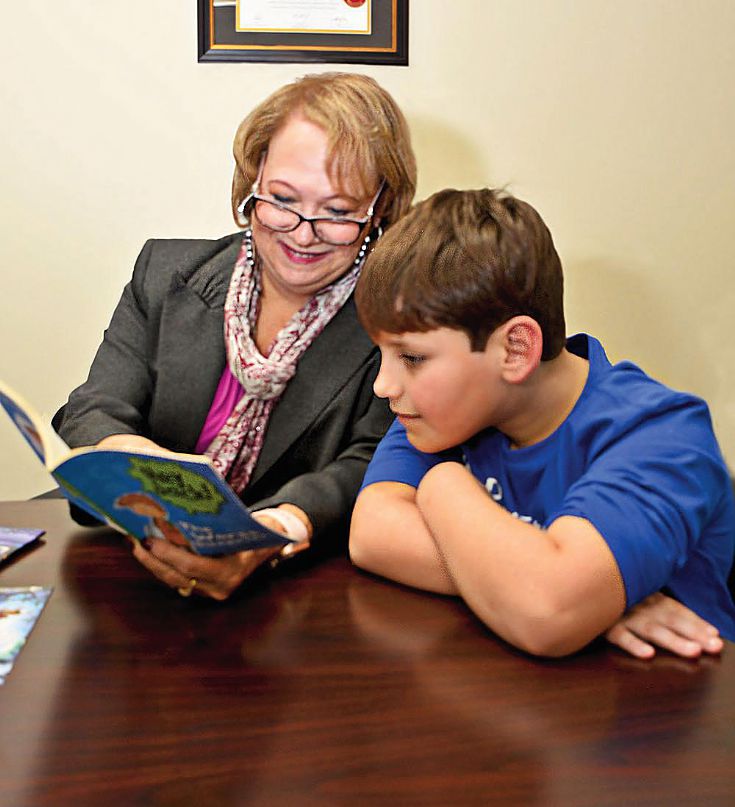
ONE TO ONE: Providing individualized instruction tailored to the specific needs of students with reading disabilities is highly beneficial.
abilities is highly beneficial. Strategies such as evidence-based reading and structured literacy programs, which include explicit instruction, and multisensory teaching techniques have shown promising results in improving reading skills and reducing behavioral issues.8
- Assistive Technology: Incorporating assistive technology tools, such as text-to-speech software or audiobooks, can support students with reading disabilities by providing alternative ways to access and comprehend text. These tools can also enhance students' independence, confidence, and engagement in the learning process.9
- Social-Emotional Support: Creating a supportive classroom environment is essential for students with reading disabilities. Implementing social-emotional learning programs and fostering a positive teacher-student relationship
can help address emotional challenges, build resilience, and promote positive behavior.10
- Collaboration Among Educators, Parents, and Professionals: Collaboration among educators, parents, and relevant professionals, such as special education teachers, reading specialists, speech and language therapists, and school psychologists, is vital for understanding and addressing the needs of students with reading disabilities.11 Regular communication, sharing of strategies, and coordinated efforts can maximize support and intervention effectiveness.
The relationship between reading disabilities and behavior in educational settings is a significant and sometimes complex one, and it demands attention from all stakeholders involved in the special education process. By understand
ing and actively addressing the emotional and behavioral challenges faced by students with reading disabilities, and implementing evidence-based interventions, educators can create a learning environment that supports their academic growth, emotional well-being, and overall success in and out of the classroom.•
References
- Reading, Writing, Math, and Content-Area Interventions for Improving Behavioral and Academic Outcomes of Students with Emotional and Behavioral Disorders. Campbell, Aaron R.; Bowman-Perrott, Lisa; Burke, Mack D.; Sallese, Mary Rose. Learning Disabilities: A Contemporary Journal, v16 n2 p119138 2018.
- Are Reading and Behavior Problems Risk Factors for Each Other? Paul L. Morgan, George Farkas, […], and Rayne A. Sperling. Volume 41, Issue 5, September 1, 2008.
- Are reading difficulties associated with bullying involvement? Tiina Turunen, Elisa Poskiparta, Christina Salmivalli. Learning and Instruction,Volume 52, 2017.
- Self-image and reading development: the effect of self-image on reading development among pupils in grade 2. Linda Fälth, Idor Svensson, Sara Carlsson, Stefan Gustafson. The Online Journal of Counseling and Education, ISSN 2146-8192, Vol. 3, p. 17-34
- Neurological deficits and comorbidity in children with reading disorder. Sajida Naz, Najma Najam. Psychiatry and Clinical Psychopharmacology, 2019, VOL. 29, NO. 4, p. 674–681.
- Dyslexia (specific reading disability). Shaywitz, S. E., & Shaywitz, B. A. (2003). Biological Psychiatry, 54(9), 947-958.
- Interventions for children's language and literacy difficulties. Snowling, M. J., & Hulme, C. (2012). International Journal of Language & Communication Disorders, 47(1), 27-34.
- The importance of providing effective interventions. Torgesen, J. K., Wagner, R. K., Rashotte, C. A., & Herron, J. (2010). In B. R. Foorman (Ed.), Preventing and Remediating Reading Difficulties (pp. 39-55). Baltimore, MD: Paul H. Brookes Publishing.
- Assistive Technologies for Students with Dyslexia: A Systematic Literature Review. C. Smith & M. J. Hattingh. Innovative Technologies and Learning. International Conference on Innovative Technologies and Learning 2020. Lecture Notes in Computer Science(), vol 12555.
- Adolescent Development for Students with Learning Disabilities and Behavioral Disorders: The Promise of Social Emotional Learning. Allison B. Dymnicki, Kimberly T. Kendziora, David M. Osher. Classroom Behavior, Contexts, and Interventions ISBN: 978-1-78052-972-1, eISBN: 978-1-78052- 973-8. Publication date: 29 August 2012.
- Responding to nonresponders: An experimental field trial of identification and intervention methods. McMaster, K. L., Fuchs, D., Fuchs, L. S., & Compton, D. L. (2005). Exceptional Children, 71(4), 445-463.
ABOUT THE AUTHOR:
Maria Torres, MA., LDT-C is a licensed K—8 Teacher, and Teacher of the Handicapped who began her career at Honor Ridge Academy located in Clark, NJ, 36 years ago, and now serves as the School's Principal. She holds two masters degrees in Learning Disabilities and Educational Leadership, and is a licensed NJ Learning Disabilities Consultant and Dyslexia Specialist. A dedicated educator, Ms. Torres serves as Director of the Children's Dyslexia Center in Hasbrouck Heights, where she is a teacher trainer in structured literacy. She was a former President of the New Jersey Chapter of the International Dyslexia Association.